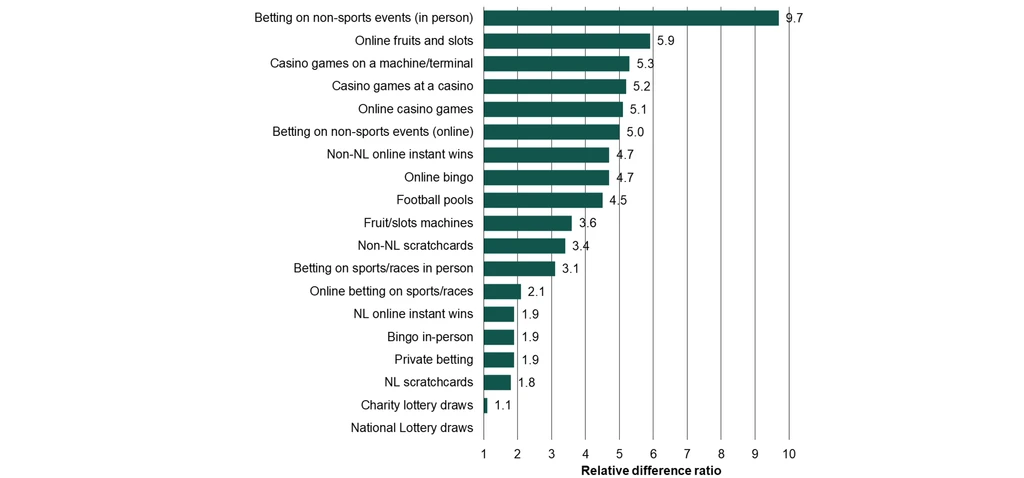The latest UKGC statistics reveal that players who place in-person bets on novelty bets are nine times as likely to have a problem gambling issue compared with the overall average of high-risk gamblers across all sectors.
According to UKGC’s Gambling Survey for Great Britain released today (25th July), the UKGC Gambling Survey for Great Britain shows that in-person betting on non-sporting events represents the vertical where the average number of high-risk gamblers is highest (PGSI scores of 8+).
Online bettors on novel markets are 5x as likely to have high risk than average.
Online slots had rates that were six times more than the average. Online bettors on sports were less likely than live bettors to be classified as high-risk. Online casino users, however, were more high-risk than those who gambled in a retail casino.
Data from the UK Gambling Commission survey included participants who gambled within the last 12 months.
A new scoring system measures problem gambling behavior
In the UKGC survey, a new system of scoring called Problem Gambling Severity Index was used to assess those who were surveyed on their gambling problems.
A score of zero on the PGSI represents a player who has not displayed any problematic gambling behaviors. The scale is based on nine different behaviours. As it increases, the severity of the adverse effects experienced by the players also increases.
Participants reported that they felt guilty for gambling too much and worried about losing money.
Increase in problem gambling among non-lottery groups
The majority (85.6%) of those surveyed were low-risk gambling gamblers, with scores between 1 and 2. The total number of gamblers also included moderate-risk, and problem gambling. These two groups accounted respectively for 2.5% and 3.7%.
In the category of non-lottery, however, the proportions of high-risk and moderate-risk players grew by almost 5% each, representing a rise from the group as a whole.
The 18-24-year-old age group had the most problem gamblers (9.1%) based on the PGSI. This figure fell to 8.4% in the age group above, while the bracket of 55 to 64 years old had the lowest proportion (0.7%).
Males are more likely to gamble
In terms of overall gambling, 63% males and 58% females had played in the last 12 months. In the past 12 months, 63% of men and 58% of women gambled.
In terms of age, the 25-34-year-olds were the most likely to have gambled outside the lottery in the past 12 months (52%). 50 % of those 35 to 44 years old had placed bets outside the lottery. The participation rate decreased as people aged, reaching 19% for those over 75.
If you exclude the lottery, those aged 18 to 44 years old had the most participation in online gambling during the past month (20%-21%). In the four-week period before the lottery, those aged 45 to 54 years old gambled online the most (43%).
UKGC unveils new methodology
The UK Gambling Commission surveyed 9,787 people. The breakdown of returns showed that 64% completed the survey (6,303) online, and 36% (3 484) via post.
The Commission warned previously that results from the “push to web” method could not directly be compared with prior gambling or healthcare surveys.
In a guideline released last week, it said that the survey shouldn’t be used as a way to measure gambling addiction in Great Britain or to determine the overall gambling harm rate in Great Britain.
The survey was criticized even before its publication by some industry stakeholders who claimed that the methodology could have overstated the risk level in the gambling sector.



